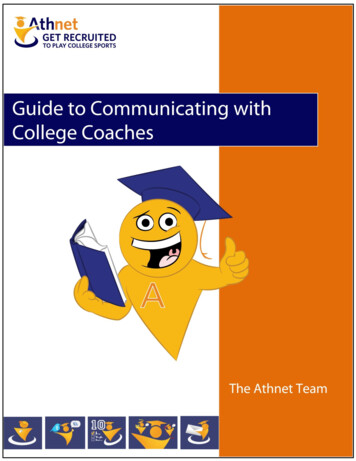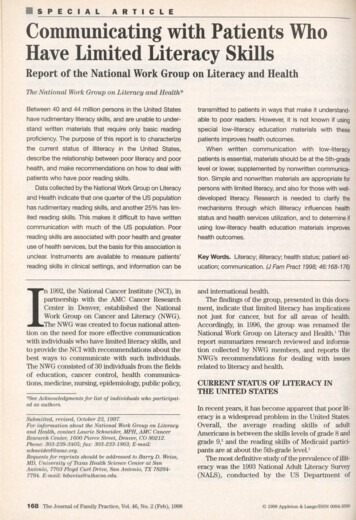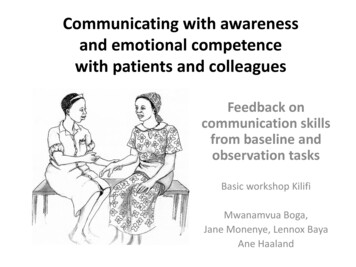
Transcription
1TABLE OF CONTENTS14 MUST -HAVES IN COVER LETTERS TO COLLEGE COACHESWRITING A RESUME THAT COLLEGE COACHES WANT TO SEE7 QUESTIONS TO ASK WHEN CALLING A COACH FOR THE FIRST TIME5 THINGS TO CHECK ON F ACEBOOK AND TWITTER3 WAYS TO USE SOCIAL MEDIA IN THE RECRUITING PROCESSHOW TO SET UP YOUR EMAIL FOR THE RECRUITING PROCESS50 REASONS TO FOLLOW UP WITH A COLLEGE COACH10 QUESTIONS TO ASK ON YOUR UNOFFICIAL VISITGET PREPARED FOR RECRUITING PHONE CALLS8 WAYS TO USE E MAIL IN THE RECRUITING PROCESSTHE 8 MOST IMPORTANT NCAA COMMUNICATION RULES AND DATESTHE 5 MOST COMMON LIES RECRUITS TELL DURING THE RECRUITING PROCESS5-POINT RECRUITING CHECKLIST FOR HIGH SCHOOL SENIORS10 THINGS TO DO ON YOUR OFFICIAL VISITWHAT YOU H AVE TO KNOW ABOUT THE APPLICATION AND ADMISSIONS PROCESSDO’S & DON’TS WHEN NEGOTIATING FOR A S CHOLARSHIP23578910121415161718192021
24 Must Have‟s in Cover Letter‟s to College CoachesEvery college coach is now recruiting online in one form or another. One of the best ways tointroduce yourself to coaches and initiate the recruiting process is with a well written emailcontaining your cover letter and athletic/academic resume. Here are some tips for writing aquality cover letter for coaches.Be concise – Coaches don’t have enough hours in the day. If you send them a full page coverletter talking about your entire athletic, academic and community accomplishments they won’tread it or look at anything else you send them. The entire cover letter should be two to threeparagraphs and no more than half a page.Cover the big three: 1.Who you are, 2.Athletics, 3.Academics – Coaches need to know yourname and grad year immediately so they know whether or not they can respond to your emailright away. Follow that information with a quick introduction of your measureables (height,weight & position) along with your academic information. List your GPA and if you have takenthen SAT or ACT include that information as well. You will want to also include your single bestathletic honor and academic honor. Don’t list any more than one each, save that for yourresume.Triple check spelling and grammar – Coaches make quick opinions about athletes based onyour writing, poor spelling shows laziness and a lack of attention detail. Don’t think that becauseyou used spell check on the computer it is correct. Take your cover letter and resume to yourEnglish teacher and have them quickly look it over.Make it personal – As more and more athletes contact coaches through email you need tostand out. Coaches aren’t responding to a generic letter unless you are an amazing athlete. Ifyou take the time to write a personalized message to coaches they will take time to respond toyou. Go beyond just changing the name of the University in the email; include a couplesentences about their university and their programs most recent results.
3Writing a Resume College Coaches Want to SeeFall is here and it's time for high school seniors to start consideringtheir options for college. High school athletes looking to play incollege must take the extra step of submitting resumes to collegecoaches who make decisions about scholarships. Use these tips tomake your resume draw the attention of college coaches.Keep it simple: A simple resume is the best resume no matter ifyou're sending it to college coaches or Bill Gates. Keep the lengthdown to one or two pages. And when it comes to formatting, don't usefancy fonts, flourishes or other distractions. Your accomplishmentsshould speak for themselves.Leave off the objective: And in the spirit of keeping it simple, leave out the objectivestatement, which is considered an outdated portion of resumes anyway. They are self-servingand don't really tell coaches anything they don't know about you already, which is that you wantto play for their team. Instead, you could include a short personal statement about yourapproach to your sport or get right into the information college coaches want to know about you.Use relevant information: As you consider the statistics and awards to include on a resume,examine your entire statistical profile to determine the most relevant information to include aboutyourself. What information says the most about the kind of player you are? What awardshighlight your most significant accomplishments both in sports and academics? Include thisinformation on your resume. College coaches can learn more about all your stats and awardsonce they select you for their team.Academic focus: As a college athlete, you must maintain a minimum academic standard andcollege coaches want to know they won't have to worry about your academics. If you can carryyourself academically while proving yourself in your sport, you become that much more of anasset to the team. Include your GPA, your SAT or ACT scores, academic awards and anyhonors or advanced placement classes you may have taken.Include references: Provide your references up front on your resume so college coaches don'thave to take the extra step to ask for them. You should include references who can speak bothto your athletic capabilities, your academics and your integrity off the field. Make sure you havelet your references know ahead of time that you used them on your resume so they can beprepared for a call from a coach.Proofread, proofread, proofread: Before submitting your final resume to college coaches,make sure you have triple-checked every last detail. Are addresses correct? Phone numbers orother contact information? Did you spell everything correctly? Read the resume several timesyourself and then enlist the help of parents, friends or teachers to double-check it again for you.Nothing will sink your chances with any employer or coach faster than a resume with mistakes.Include a photo: Finally, include a picture of yourself. Let college coaches put a face to thename on the resume. A photo adds a touch of humanity to an otherwise impersonal process.Photographs can also allow a college coach to get a first look at your physique.Kick your college search into high gear with these resume tips that will help college coachestake notice of you and land you a spot on the team of your choice.
47 Questions to Ask When Calling a Coach for the First TimeAre you ready to start calling college coaches?Being recruited to a college sports team is a very big deal for the athletes as well as theirsupporting families involved. If you are engaged during the initial recruiting process, thecommunication between you and the coach is one of the most important factors during therecruiting process.To help you prepare, write out your questions ahead of time. That way you can make sure youcover all your bases and can easily take notes. The more you communicate with a coach, theeasier it will be for you to figure out if you are both on the same page. Is there a connectionbetween you and the coach? Do you feel comfortable? Is this someone you could imagineplaying for? These are the type of questions you want to keep in mind as you are building thatcoach/recruit relationship.But what do you say when you are calling college coaches for the first time?Here are 7 important questions to ask during the recruiting process:What does it take to earn a scholarship with your program? Knowing what it takes to earn ascholarship will help you with meeting the eligibility criteria. Many may not know it but a majorcause in not winning a scholarship is simply because people don't meet the eligibility criteria.Did you know that missing an application deadline or not having a high enough GPA is anautomatic disqualifier? There are millions of scholarships available and you don't have to be arocket scientist, great writer or have a 4.0 GPA to get one. Sometimes all it takes in meeting theeligibility criteria is being persistent.Can I meet with you if I make an unofficial visit? This is an important question becausethese visits are vital for coaches. They don't want to burn any bridges with future recruits, somaking an unofficial visit is common. Also coaches don't know if you're going to blow up oneday and sometimes half the battle is getting an athlete on campus.Where do you typically evaluate your recruits? This is helpful so you get an idea on when orwhere they scout for athletes at. Coaches view tapes but they also scout talent at camps,tournaments and showcases.Do you have any camps, tournaments or showcases you recommend I attend? This is theend goal when calling college coaches because your overall objective is to get evaluated. Ifthey give you a recommendation, chances are they will be there.How is your recruiting class looking for my graduation year? This will help you evaluateyour own abilities with respect to other top players in your recruiting class. There are hundredsof players who play at your level so you have to decipher yourself from the rest. Calling collegecoaches can help with this because it shows your interest in their program. Taking time out ofyour day to make a phone call can be a major impact.What is the best way to update you on my progress? Make it as convenient as possible forthe coach to evaluate you. The more they start seeing you as well as hearing about you, thegreater your chances of being evaluated. You also want them to be updated on any special
5recognitions, awards, etc.What are good academic goals for your university? This will help you stay on track with theuniversity’s eligibility criteria. Coaches care about grades so this shows that you care as well. Itis also an excellent way for you to show your academic ability.
65 Things to Check on Facebook and Twitter Before Contacting College CoachesIf you are a varsity high school athlete with aspirations of playing your sport at the collegiatelevel, and your performance in high school was noteworthy enough to attract college scouts,you need to prepare for the recruitment process. It is an exciting, heady experience that isdesigned to sell you on attending a specific college; replete with great coaching, nationalexposure, hopefully a national title, and a successful college career. In the past, recruitingprocedures meant letters of interest mailed to athletes, phone calls, and a visit to campus by therecruit, all aimed at discovering whether or not the athlete and school were going to be a goodfit.That was 10 years ago.We live in a world of rapidly decreasing privacy; even the private citizen leading an ordinary lifeis an open book, but high profile people like athletes, celebrities, politicians are under intensescrutiny. When millions of alumni dollars are at stake along with a coach's career, a school'sreputation and NCAA eligibility, prospective student-athletes are subject to a thoroughbackground check looking for past indiscretions that would be a potential source ofembarrassment to the school, or worse, would result in athletic sanctions.With the proliferation of social media, and all the information and activities that are discussed onvenues like Facebook, Twitter, etc, high school students need to assume that their accounts aregoing to be reviewed by colleges. Be aware that before contacting college coaches to enter intothe active recruiting process, you need to carefully examine and clean up your social media.Here are the main points to consider before contacting college coaches:1) Remove all references to restaurants, products or services before contacting collegecoaches. You are an amateur athlete, not a professional, and your profile can't appear to beendorsing anyone or anything. However innocent it may seem, know that even the suggestionof endorsement can be spun to make it seem as though the reference is a paid endorsement.2) Check out your friends and your photos. Promptly remove anything that is in the slightestway lewd, suggestive, inappropriate or shows anything that can be construed as illegal beforecontacting college coaches. If you need guidance on determining what needs to be omitted, aska trusted adult for help.3) Clear your wall and Twitter feed. Again, remove everything that does not present you as agood citizen before contacting college coaches. You don't have to be perfect but you do have tobe marketable, and for college, that means wholesome.4) Unfriend or unfollow anyone who does not conform to the guideline laid down in #3. Ifyou need some help with figuring these criteria out, ask your high school coach for assistance.He or she should be able to review your social media and help you with judgment calls on whomto unfriend and/or unfollow.5) Set your privacy settings fully private. The greatest clean up in the world is useless if yourprivacy settings are not fully private; the issues that you just resolved will come creeping back.Worse, you may have some new "frenemies" who are now angry at you for "dumping them" andare seeking to damage your reputation. Be vigilant, militant, and practical about guarding yourreputation. Remember, it only takes a second to destroy a good reputation built over a lifetime.Don't let it happen to you!
73 Ways to Use Social Media in the Recruiting ProcessSocial media is changing the way we communicate and it is havinga major impact on the college recruiting process. Whether you likeit or not coaches and universities are looking at your social mediaaccounts like Facebook, Twitter and YouTube for information.The NCAA is still trying to figure out how to deal with social mediabut college programs are already way ahead of them as mostuniversities and college athletic programs are very active in socialmedia. This is a great opportunity for recruits to learn more about aprogram and ultimately make a better decision about where to play at the college level.Be sure to take steps and set up your online profiles for the recruiting process. Once you areready, here are some tips for using social media in the recruiting process.Friend/Like them on Facebook – Only a few years ago there were almost no college programson Facebook. Now, pretty much every college program and team has a Facebook page. Teamsthat are active are Facebook are constantly sharing new photos from competitions and updatingpeople who like them on results. This is a great opportunity for you to learn about the program,show your interest by liking their updates and maybe getting the chance to friend current teammembers and get a better idea of what life is like competing for that program.Follow them on Twitter – Not as many schools and coaches are on twitter as Facebook but forthose that are it is a great opportunity for potential recruits. Twitter is a great place to get adeeper sense of a program. In general, coaches and programs update their twitter more oftenand generally share more of their personal thoughts. You can get a sense of what it might belike to be a part of that team by following them. Just like Facebook the key is that you interactand show interest. Mention them in your tweets and retweet their good results and show you areserious about possibly being part of their team.Subscribe to their You Tube Channel – You Tube can be the single best place for a recruit tolearn about a program. Tech savvy athletic programs are using you tube to overcome shrinkingrecruiting budgets to share video with prospective recruits. Follow and friend their You Tubechannel and you can automatically get updates every time they share new video footage. Youcan see footage from games, watch athlete and coach interviews sometimes go on tours offacilities all online.
8How to Set Up Your Email for the Recruiting ProcessCollege coaches today are using email as their primary recruiting tool. Ifyou are a dedicated high school athlete who wants to be considered aviable candidate in the competitive world of college recruiting, it is criticalthat you approach email communications in a professional, efficientmanner. If you’re unsure how to accomplish this, here are some tips:Dedicate one email account entirely to recruiting. Many email providerssuch as Gmail, Hotmail and Yahoo! offer free accounts, so there’s no reason not to create anew account just for recruiting purposes. So do it! Having a separate account for recruitingensures that you do not mix up your recruiting emails with other business or private matters,saving you the potential embarrassment of accidentally sending personal emails to the wrongrecipient. It will also help you to never miss an important email from a coach. Save yourself timeby creating templates for oft-used text blocks, like personal stats and biographical info.Choose a good name. Email correspondence will be your first form of contact with manyrecruiters, and may precede an in-person meeting by many weeks or even months. Because ofthis, it is imperative that you choose an email address that represents you well. In your personallife, you might be getting along just fine using screen names like “lildirtymoney” or“missfoxyvixen”. But is that really the foot you want to put forward with college coaches?Instead, consider using some combination of your first and last name. Not only will it comeacross as more professional, it will help coaches recognize your name without having tomemorize an additional alias.Organization is key. Many email programs include a folder organization system. Use this toyour advantage by creating a new folder for each program and coach. You may have contactwith more than one coach per program, so it is advisable to create coach folders as sub-foldersunder the program folder. Creating a contact profile for each coach is not a bad idea, either – itwill allow you to store other contact details such as office phone and cell phone numbers, all inone handy place.Create a signature. Most email clients allow you to store a signature, which is a block of textadded automatically to the end of every email. A signature is important because it includes allthe information a coach needs to contact you. If this info is easily found in every email you send,coaches are much more likely to get in touch with you. Use this feature to your advantage.Signatures should include your full name, your high school and city, class graduation date, andcurrent contact information. Make yourself as available as possible to coaches by includingmany ways to contact you: cell phone, home phone, and Skype name, for example. If any of thisinformation changes, update your signature immediately.Check your email daily. Remember that college coaches are in their offices every day,checking their emails almost continuously. Once they hit the “Send” button, they consider theirmessage communicated, i.e. you, the recipient, have already read the message. In this vein,coaches will expect same-day responses from their recruitees whenever possible. Replying toan email more than 3 days after it was sent casts you in a bad light, making you seemirresponsible and ambivalent. Prompt responses show enthusiasm and interest in the program.And remember, decisions are made in a matter of hours or sometimes even minutes, so it isimportant for you to keep your fingers on the pulse by checking your email at least once a day.
950 Reasons to Follow Up with a College CoachBeing proactive in the recruiting process is a must. Coaches are trying to evaluate 100’s ofathletes each year and the easier you make it on them the better our chances of being a collegeathlete are. If you can’t think of a reason to update a coach check out the list below. Is theresomething that we missed? Do you have another reason to update a coach?1. New highlight tape2. Your summer tournament schedule3. Your summer camp/combine schedule4. When you receive an all-league, all-state honors or awards5. Establishing a new personal best time or height6. Beating a higher ranked opponent7. Getting new combine numbers8. When you get your new (higher) SAT or ACT scores9. The end of the semester/quarter with a grade update10. After your season finishes11. When the school year is starting12. When the school year is finishing up13. Wishing them a happy holiday14. When one of their athletes receives a prestigious honor15. When they have a big win16. After they win a championship17. If you are coming to visit their school18. When you have applied to their school19. When you have decided to accept another scholarship offer20. Letting them know when you receive a new scholarship offer you like21. When you know how much your family can afford for school22. Letting them know how your summer time training is going23. When you have a game film you want to share with them24. When you have developed a new skill25. If your team has won a championship26. Explaining what your summer training schedule is going to be27. Letting them know new references to contact28. Thanking them for their evaluation of your video29. Establishing a time you can call them30. Finding out what tournaments they will be using to evaluate recruits31. To find out where you rank in their recruiting class32. Asking if they are going to offering you an official visit33. Asking if they are going to be offering you a scholarship34. To see what camps or combines they will be working at over the summer35. To see if you can get tickets to their home game36. When they receive a coaching honor37. At the start of their season38. At the end of their season39. After they sign a major recruit40. When you have signed up for the NCAA Eligibility Center41. When you have signed up for the NAIA Eligibility Center42. If you have narrowed down your list of potential schools43. If there was a natural disaster near their campus44. If the University gets a national honor
1045. If a different team at the school wins a championship46. To confirm when you will be visiting campus47. Asking where you rank after they sign a new recruit48. To see if they need more film on you49. To see what summer training you should be doing50. Because you should trying to always learn more about the program and university
1110 Questions to Ask on Your Unofficial Visit1) On your unofficial visit to the school of your interest, you need to know the requirements theschool expects to be met, to evaluate what you might need to do to improve your chances ofreceiving a scholarship. Whether it might be a certain grade point average, involvement indifferent athletic programs while you were in high school, elite athletic status, recommendationsfrom coaches, or past game footage, you will want to find out the exact details on what they arelooking for, for athletic scholarship candidates.2) Academic support will be very important to your success managing both the commitmentsfrom your classes and from your sports teams. You will want to find out how academic advisorsfor the athletic program might be able to help you to meet your academic goals. Find out whatservices advisors and professors offer and whether they may assist students in obtaining tutors,arrange study groups, or even help you to create your schedule, to effectively get good grades,while also excelling at your sport.3) It is interesting to gather information about how well the sports programs are doing, on yourunofficial visit, to enable you to see concrete numbers about how others who experiencedbalancing school work and athletics met the challenges and demands at the school. Thepercentage may prove how solid the sports programs are and how much support the athleteswere provided, to enable them to be successful and graduate.4) Whether you live local to the school or not, you will want additional details of what’s expectedof you when school is not necessarily in session. Many coaches expect a year roundcommitment, so you will want to find out on your unofficial visit if you are required to train fromhome or onsite during summers or holidays, in order to plan accordingly with family members, ajob, or any other obligations you have.5) On your unofficial visit, exploring living arrangements is a must, since you and your parentsneed to feel comfortable about where you will be staying. You may want to find out if mostathletes live in dorms with roommates that are also athletes, if there are options for sharingrooms versus having your own space, and what the timeline is for student athletes, in regards toliving on campus or off, through the years.6) As an athlete looking to become involved in college level sports, you are already accustomedto coaches with a variety of personalities and you have had years of practicing your specificsport, in many different capacities. It’s important to find out on your unofficial visit, what thetraining regimen is, to prepare yourself for when the sport is in season, and to find out a sampleschedule, information on drills that might occur, and specifics about how the coach runs thepractice, for each position on the team.7) Having camaraderie with your potential new college level sports team members is anecessity, so find out from the coach or better yet, see if you can speak with a current teammember on your unofficial visit, to find out how they let loose outside of school and sports. Youwill be most successful and work hardest when you have a team you relate to, so this will helpyou to see if and how you will fit into their lifestyle.8) As an athlete, just because the season ends, doesn’t mean you don’t need to continue towork out, train, and work with professionals on campus to help with any physical or medicalissues. You want to find out on your unofficial visit what tools they provide you to continue to besuccessful in your sport and to keep on challenging yourself to get ready for a new season,
12when the season is not in session.9) When you do the research, pick a school you are interested in, and find the perfect coach tochallenge you athletically, you want assurance that they will continue to work with youthroughout your tenure at the school. You want to find a coach you respect, who can help withyour development, and lead you to success, and once you do so, you will want to make suretheir timeline at the college matches with yours, so there are no surprises.10) On your unofficial visit, you need to size up your competition. Find out what the coach isreally looking for and how well the recruiting staff and decision makers are doing, in terms oftheir search for new additions to their athletic teams. Get a sneak peek into how many peoplehave shown interest and what you are going to need to do to stand out.
13Get Prepared for Recruiting Phone CallsGetting prepared for recruiting calls is a very exciting time for an aspiring young athlete.However, choosing the right college can be an extremely tricky process, and may certainlyseem daunting, particularly when there are so many diverse options available. To get preparedfor recruiting calls there a number of steps which can be taken to insure a positive, productive,and perhaps most importantly, legal experience.The primary governing body of college sports, the NCAA, must follow statutes and policiesregarding high school recruits. One of these dictates that for most sports, college coaches maynot call or visit a recruit until July 1st after their junior year. Coaches may send brochures to thehigh school, but direct contact is not allowed. Conversely, however, there are is no limit to whenor how often an athlete can contact the coach. Some programs will encourage prospectivestudent-athletes to be proactive and take the initiative, before the university itself is permitted toformally contact. This will help athletes gauge potential interest of a school in their talents, sothat when the recruiting window is open, they will have some conception of what to expect.As with seeking a job, ideally a great deal of background research will occur prior to receivingany recruiting calls. Coaches will be much more impressed with a recruit that already has someworking knowledge of both the school and the athletic program which they are trying to sell.First impressions are always crucial, and many high school athletes are woefully unpreparedand uneducated regarding these matters. To get prepared for recruiting calls it is very important,in the very least, to know how the program has fared in past years, if there are any notablealumni, and if the coach himself has garnered any specific honors or awards. Also, make aneffort to know exactly what kind of program each school offers. Facts such as roster size, NCAADivision (I, II, or III), and athletic conference are all readily accessible via the internet for anyserious program. This will give you an idea of how competitive a team is, and perhaps a looseidea of the atmosphere you can expect in the locker room.The final crucial step to preparing for recruiting calls is knowing what questions to ask thecoach. This is another way to demonstrate an informed and educated interest in the program,but it also allows the athlete the opportunity to discover "behind the scenes" information notadvertised in brochures, on the official website, or readily offered by the coach. Some suchquestions include, how big will the freshman be? Are there cuts? How many walk-ons versuson-scholarship athletes are there?A very timely question to ask, depending on the sport you are in: is the program in any dangerof being canceled due to funding issues or Title IX concerns? In recent years several programswith a long, illustrious history (such as Seton Hall University's track and field program) were cutdue to budget concerns and the university's reorganized priorities. Be sure that your sport willalways be there.Finally, while it may seem presumptuous to ask directly how much money the coach is willing tooffer, athletes and their families should be comfortable talking about specific numbers. Asawkward as it might seem, the coach is definitely there to negotiate, and gauging his responseafter mentioning specific numbers will give you an idea of how much scholarship money youmight be able to expect from that university.
148 Ways to Use Email in the Recruiting ProcessReach out to coaches
1 table of contents 1 4 must-haves in cover letters to college coaches 2 writing a resume that college coaches want to see 3 7 questions to ask when calling a coach for the first time 5 5 things to check on facebook and twitter 7 3 ways to use social media in the recruiting process 8 how to set up your email for the recruiting process 9 50 reasons to follow up with a college coach 10











